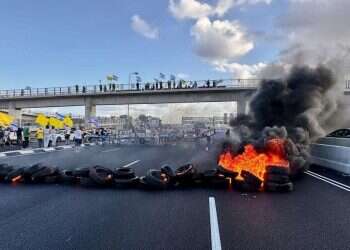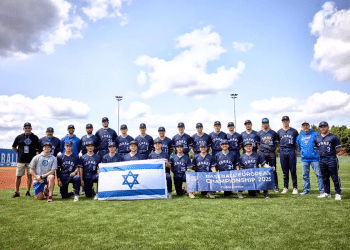Israel and Palestinian Islamic Jihad reached a ceasefire agreement Thursday morning that was to have gone into effect at 5:30 a.m. to end two days of heavy fighting.
PIJ spokesman Musab al-Berim confirmed the ceasefire, saying it was brokered by Egypt. Shortly after his announcement, however, rockets were fired at Israel from Gaza, setting off air-raid sirens in southern Israel at 6:11 a.m., and then again at 6:59 a.m. and 7:19 a.m.
Follow Israel Hayom on Facebook and Twitter
At 10: 54 a.m., some two hours after the IDF also confirmed the ceasefire agreement, more rockets were fired at southern Israel from Gaza. The Iron Dome defense system reportedly intercepted two rockets, while others were said to have landed in open fields.
There were no reports of casualties.
A top Egyptian official said the "ceasefire agreement comes as a result of Egypt's [mediation] efforts" and has been endorsed by "Palestinian factions including Islamic Jihad."
Israel will stop shooting if Palestinian terrorists in Gaza stop the rocket attacks, Foreign Minister Israel Katz said on Thursday morning, denying that Israel had changed its open-fire policy as demanded by PIJ.
"Quiet will be answered with quiet," Katz told Army Radio. "The State of Israel will not hesitate to strike at those who try to harm it, from the Gaza Strip or from anywhere else."
Late Wednesday, PIJ leader Ziad al-Nakhalah said in an interview with Lebanon's told Al-Mayadeen TV that his group was ready for a cease-fire if Israel accepted "conditions," including a halt to targeted killings of Palestinian terrorist leaders, the IDF's sometimes lethal response to weekly Gaza border riots, and steps to ease its blockade on the coastal enclave.
Al-Nakhala said he expected to hear Israel's response via Cairo within hours. Should a truce not be agreed, he said, "the Jerusalem Brigades (PIJ's armed wing) is able to manage the battle, and for a long time."
"Quiet will be answered with quiet," Israel's Army Radio quoted an unnamed Israeli government official as saying. "Islamic Jihad wants a ceasefire, and it is thus trying to create a false impression of achievements."
Earlier Wednesday, Israeli aircraft struck Palestinian Islamic Jihad targets throughout the Gaza Strip while the Iran-backed terrorist group rained scores of rockets into Israel for a second straight day of the heaviest round of fighting in months. The death toll rose to 32 Palestinians, including a 7-year-old boy and two other minors.
The dead included six Palestinians from a single family who were killed in an Israeli airstrike near their house in Deir al-Bala in central Gaza early Thursday, the Gaza health ministry said. It was the deadliest incident since the beginning of the current fighting.
The UN's Mideast envoy, Nickolay Mladenov had rushed to Cairo to work with Egyptian mediators on arranging a truce. A PIJ delegation also arrived in Egypt.
Mladenov said that UN was "working to urgently de-escalate the situation." He also condemned "the indiscriminate launching of rockets and mortars" at Israeli civilians as "absolutely unacceptable" and said it "must stop immediately."
The fighting erupted early Tuesday after Israel killed a senior PIJ commander, along with his wife, in their Gaza home. Israeli officials say Bahaa Abu el-Atta was responsible for numerous rocket attacks and was plotting a large-scale border infiltration.
Palestinian Islamic Jihad responded by launching dozens of rockets toward Israel, some reaching as far as Tel Aviv, prompting Israel to carry out scores of airstrikes.
The rocket fire brought much of Israel to a standstill. Schools closed throughout southern Israel, people stayed home from work and large public gatherings were banned. Air raid sirens wailed during the day and into the evening. By Wednesday night, the army said 360 rockets had been fired at Israel.
In Gaza, schools and public institutions also were closed for a second day and there were few cars on the streets, with people mostly staying indoors. After nightfall, Gaza City resembled a ghost town, with streets empty and the whooshing sounds of outgoing rockets and explosions of Israeli airstrikes heard. Virtually the only vehicles on the roads were wailing ambulances.
Convening Israel's top security officials, Prime Minister Benjamin Netanyahu said he hoped the fighting would end quickly.
"We are not bent on escalation but we will do whatever is necessary to restore the quiet and security to the residents of Israel, including the residents of the south," he said.
Meanwhile, Hamas, the larger and more powerful terrorist group that controls Gaza, had avoided entering the fray – possibly foretelling the violence could be brief.
Hamas, which has fought three wars with Israel, has a much more lethal arsenal than PIJ. But as the governing authority in the territory, it also is more pragmatic and appears to have little desire for more fighting at a time when Gaza's economy is in tatters.
That could change if the ceasefire fails to hold and the death toll climbs. Palestinian health officials reported 26 dead from Israeli airstrikes, including at least 16 terrorists. Five civilians, including a woman and boys ages 17, 16 and 7, were among the dead. The identities of the others killed were not immediately known.
The IDF said it had "eliminated" at least 20 Gaza fighters since Tuesday in attacks on targets that included a rocket warhead manufacturing facility, a PIJ headquarters and a weapons storage site. PIJ confirmed that several of its fighters were killed in separate strikes.
IDF spokesman Lt. Col. Jonathan Conricus said the army was limiting its strikes to Palestinian Islamic Jihad targets and avoiding conflict with Hamas to prevent an escalation.
"However, it's very clear that if there will be Israeli casualties, the situation would change drastically and we would be forced to respond in a different manner," he said.
Israeli tanks, armored vehicles and artillery batteries took up positions along the Gaza border.
No Israeli deaths were reported, in part because of Israel's Iron Dome defense system, which has a 90% success rate when deployed, according to the IDF.
A few homes suffered direct hits, though, and there was a near miss on a major highway, where a rocket crashed just after a vehicle passed. In all, three people suffered slight wounds from shrapnel or shattered glass caused by rocket fire, medical officials said.
Israel's strikes against PIJ marked the latest manifestation of a spreading battle between Israel and Iranian proxies in the region.
Iran has forces based in Syria, Israel's northern neighbor, and supports Hezbollah terrorists in Lebanon. In Gaza, it supplies Palestinian Islamic Jihad with cash, weapons and expertise.
Netanyahu also has claimed Iran is using Iraq and far-off Yemen, where Tehran supports Shiite Houthi rebels at war with a Saudi-led coalition backing the government, to plan attacks against Israel. Hamas also receives some support from Iran.
Israel frequently hits Iranian interests in Syria. But on Tuesday, Syrian officials said an Israeli airstrike targeted a Palestinian Islamic Jihad leader in Damascus, a rare assassination attempt of a Palestinian terrorist in the Syrian capital. Israel did not comment on the airstrike, which reportedly missed the terrorist but killed two of his relatives.




